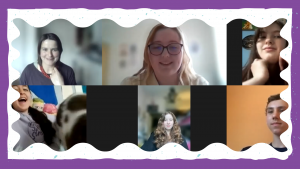In June of this year, four of our more experienced MCPs met with Alison Hardie to discuss current work with children and young people on national education policy. Alison is helping Scottish Government and agencies like Children’s Parliament to consider what a Children and Young People’s Education Council might be like. This was also an opportunity for the MCPs to reflect on their journey with Children’s Parliament.
The MCPs joined us during their summer holidays, so our call went international with children joining from Poland as well as Scotland!
Through Children’s Parliament’s work, we aim to support children’s views, ideas and experiences heard in all matters that affect them – including national education policy. Just this year we have worked on various projects which will influence national practice in education, including Learning for Sustainability, Gender Equality in Education and Dignity in School. Alongside this, we continued with our Annual Cabinet and Executive Team meetings where the MCPs met with Cabinet Ministers and some of the top decision-makers in government. Calls to action this year included change around children’s mental health and wellbeing, gender equality in schools and adults realising children’s rights.
With all this work in mind, some of our more experienced MCPs met to reflect on their journey and discuss the importance of children’s voices being included in decision making across all policy areas, but also thinking especially about schools and learning. To kick things off, we did a scavenger hunt to find something that represents what being an MCP feels like. Quick activities like this are energising in the digital space and also help us understand how children connect emotionally with the experience of participation.
One MCP used a can of fizzy pop and explained that “Being an MCP makes me feel fizzy and bubbly and excited.” – MCP, age 13.
Another found a smiley Panda bento box, and shared that “Doing Children’s Parliament, I’ve just been happy.” – MCP, age 12.
By giving these children the opportunities and platforms to share their views, ideas and opinions, in turn they grow in confidence and feel proud and happy of their voices being heard.
One MCP, age 13, noted “It gives me opportunities that a lot of my friends don’t have. I get to say what we learn about, and it makes me feel more powerful and in control of what I’m learning. It makes what I’m learning more interesting, and it’s easier to connect with because it’s stuff that I’m interested in and that I find meaningful.”
Evidently, experiences of having your voice heard can be limited as a child, and through Children’s Parliament’s work we are giving some children the chance to have a say in their future. However, more work needs to be done to ensure this approach is more widespread across Scotland.
The MCPs then moved on to think about what they felt had changed as a result of being listened to. One MCP, age 13, shared “The most noticeable change for me is the UNCRC getting incorporated into Scottish law. I think that was a big eye opener to show how far our work went, because we do bring up a lot of ideas and it is hard to get them all into action, but it really showed that they were listening too. And even though our ideas were very big, they were still getting taken seriously and people were still trying to get them to be achieved.”
In moments like this, the MCPs can see that they have been listened to and their ideas have been valued. A vital player in children’s participation, and a sense of being acknowledged and experiences valued, is the feedback loop.Children want to hear back on what they have shared. An MCP, age 13, reflected on this, saying “We deserve to be involved as much as everybody else in the project has been involved, like all the adults. Regular updates, and if they can’t do some of the stuff, then making sure we know what they can’t do and more importantly, what they can do. We don’t want it to be false hope. We want to know what we’re being involved in, how far our words have got!”
Without the feedback loop being closed, children are left in the lurch and questioning whether their input was taken seriously. To have their voices truly heard, children deserve to receive feedback in a timely and child-friendly manner.
It was lovely to catch up with these MCPs, some of whom have been working with us for upwards of five years! It was great to hear their reflections on children’s participation in national decision-making, and how valuable this process is to them. They sum it up perfectly in one quote:
“In Children’s Parliament, I feel happy because we’re saying something and it’s making a change, but not just for our generation, for generations to come! We’re making a mark in the world!” – MCP, age 12
